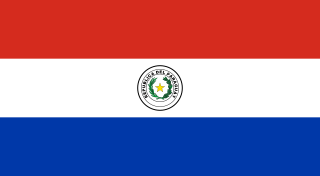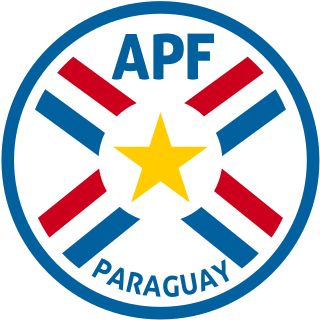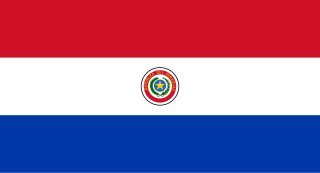
Paraguay, officially the Republic of Paraguay, is a country in South America. It is bordered by Argentina to the south and southwest, Brazil to the east and northeast, and Bolivia to the northwest. Although one of only two landlocked countries in South America, the country has coasts, beaches and ports on the Paraguay and Paraná rivers that give exit to the Atlantic Ocean through the Paraná-Paraguay Waterway.

Guaraní specifically the primary variety known as Paraguayan Guarani, is a South American language that belongs to the Tupi–Guarani family of the Tupian languages. It is one of the official languages of Paraguay, where it is spoken by the majority of the population, and where half of the rural population is monolingual. It is spoken by communities in neighboring countries, including parts of northeastern Argentina, southeastern Bolivia and southwestern Brazil, and is a second official language of the Argentine province of Corrientes since 2004; it is also an official language of Mercosur.

Yerba mate or yerba-maté, from Spanish [ˈʝeɾβa ˈmate]; Portuguese: erva-mate, [ˈɛɾvɐ ˈmate] or [ˈɛɾvɐ ˈmatʃɪ]; Guarani: ka'a, IPA: [kaʔa], is a plant species of the holly genus Ilex native to South America. It was named by the French botanist Augustin Saint-Hilaire.

The Paraguayan War, also known as the War of the Triple Alliance was a South American war fought from 1864 to 1870, between Paraguay and the Triple Alliance of Argentina, the Empire of Brazil, and Uruguay. It was the deadliest and bloodiest inter-state war in Latin America's history. It particularly devastated Paraguay, which suffered catastrophic losses in population and was forced to cede disputed territory to Argentina and Brazil.

The Paraná River is a river in south Central South America, running through Brazil, Paraguay, and Argentina for some 4,880 kilometres (3,030 mi). It is second in length only to the Amazon River among South American rivers. The name Paraná is an abbreviation of the phrase "para rehe onáva", which comes from the Tupi language and means "like the sea". It merges first with the Paraguay River and then farther downstream with the Uruguay River to form the Río de la Plata and empties into the Atlantic Ocean.

The Paraguay national football team represents Paraguay in men's international football competitions, and are controlled by the Paraguayan Football Association. Paraguay is a member of CONMEBOL. The Albirroja has qualified for eight FIFA World Cup competitions, with their best performance coming in 2010 when they reached the quarter-finals. A regular participant at the Copa América, Paraguay have been crowned champions of the competition on two occasions. Paraguay's highest FIFA World Rankings was 8th and their lowest was 103. Paraguay was awarded second place with Best Move of the Year in 1996 for their rise in the FIFA Rankings.

Foz do Iguaçu is the Brazilian city on the border of Iguaçu Falls. The city is the 7th largest in the state of Paraná. The city's population is approximately 258,000. It is approximately 650 km (400 mi) west of the capital of the state, Curitiba, being the westernmost city in that state.

Salvador Cabañas Ortega is a Paraguayan former professional footballer who played as a striker.

Club Sol de América is a Paraguayan sports club, mostly known for its football team. The club is located in Barrio Obrero, Paraguay, and it was founded in 1909. The stadium Sol de America uses for most of its first division games is located in the suburb city of Villa Elisa on the border of the capital city, Asunción. Sol de America have won the Paraguayan First Division title on two occasions, in 1986 and then again in 1991. They also have a strong basketball team and an athletics department.

The Paraguayan Football Association is the governing body of football in Paraguay. It organizes the Paraguayan football league and the Paraguay national football team, and is based in the city of Luque, near the capital city, Asunción. In 1906, the representatives of the five existing football teams in Paraguay at that time met to create the governing body of football in Paraguay, the Paraguayan Football League. In 1998 its name was changed to its current denomination.

The Battle of Tuyutí was a Paraguayan offensive in the Paraguayan War targeting the Triple Alliance encampment of Tuyutí. It is considered to be the bloodiest battle ever in South America. The result of the battle was an Allied victory, which added to the Paraguayan troubles after the loss of its fleet in the Battle of Riachuelo.

The Río de la Plata basin, more often called the River Plate basin in scholarly writings, sometimes called the Platine basin or Platine region, is the 3,170,000-square-kilometre (1,220,000 sq mi) hydrographical area in South America that drains to the Río de la Plata. It includes areas of southeastern Bolivia, southern and central Brazil, the entire country of Paraguay, most of Uruguay, and northern Argentina. Making up about one fourth of the continent's surface, it is the second largest drainage basin in South America and one of the largest in the world.

Óscar René Cardozo Marín is a Paraguayan professional footballer who plays as a striker for Club Libertad and the Paraguay national team.
The cinema of Paraguay has historically been small. However, this has begun to change in recent years with films like El Toque del Oboe (1998); María Escobar (2002); O Amigo Dunor (2005), which competed for Best Movie in the Rotterdam International Film Festival; Hamaca Paraguaya (2006), which was screened at the Cannes Film Festival, gaining critical acclaim both in Paraguay and abroad; 7 cajas (2012); Latas Vacías (2014); and Luna de Cigarras (2014).

Fernando Armindo Lugo Méndez is a Paraguayan politician who was President of Paraguay from 2008 to 2012. Previously he was a Roman Catholic priest and bishop, serving as Bishop of the Diocese of San Pedro from 1994 to 2005. He was elected as president in 2008, an election that ended 61 years of rule by the Colorado Party.

Roberto Júnior "Gatito" Fernández Torres is a Paraguayan footballer who plays as a goalkeeper for Brazilian club Botafogo.

Larissa Mabel Riquelme Frutos is a Paraguayan model and actress from Asunción. She is one of the highest-paid models in Paraguay.
The World Organization of Independent Scouts is an international Scouting organization for traditional Scouting.

Paraguay competed at the 2011 Pan American Games in Guadalajara, Mexico from October 14 to 30, 2011. Gerardo Paniagua was the Chef de mission. Ben Hockin, a swimmer who won multiple medals at the 2010 South American Games was selected to carry the flag during the opening ceremonies. Paraguay's delegation consisted of 28 athletes in 10 sports.

Women in Paraguay have experienced significant cultural change since 1990 as a result of constitutional and legal expansions of womens rights and evolving cultural attitudes. The legal and government institutions currently existing in Paraguay were developed in part through the efforts of feminist organizations in the country that held significant awareness-raising campaigns during the 1990s to formalize the guarantees of women's rights. The 1992 Constitution of Paraguay upholds the principle of equality for all individuals and prohibits discrimination. However, many Paraguayan women are challenged by issues of social equality and status in society due to existing socio-cultural practices.
















